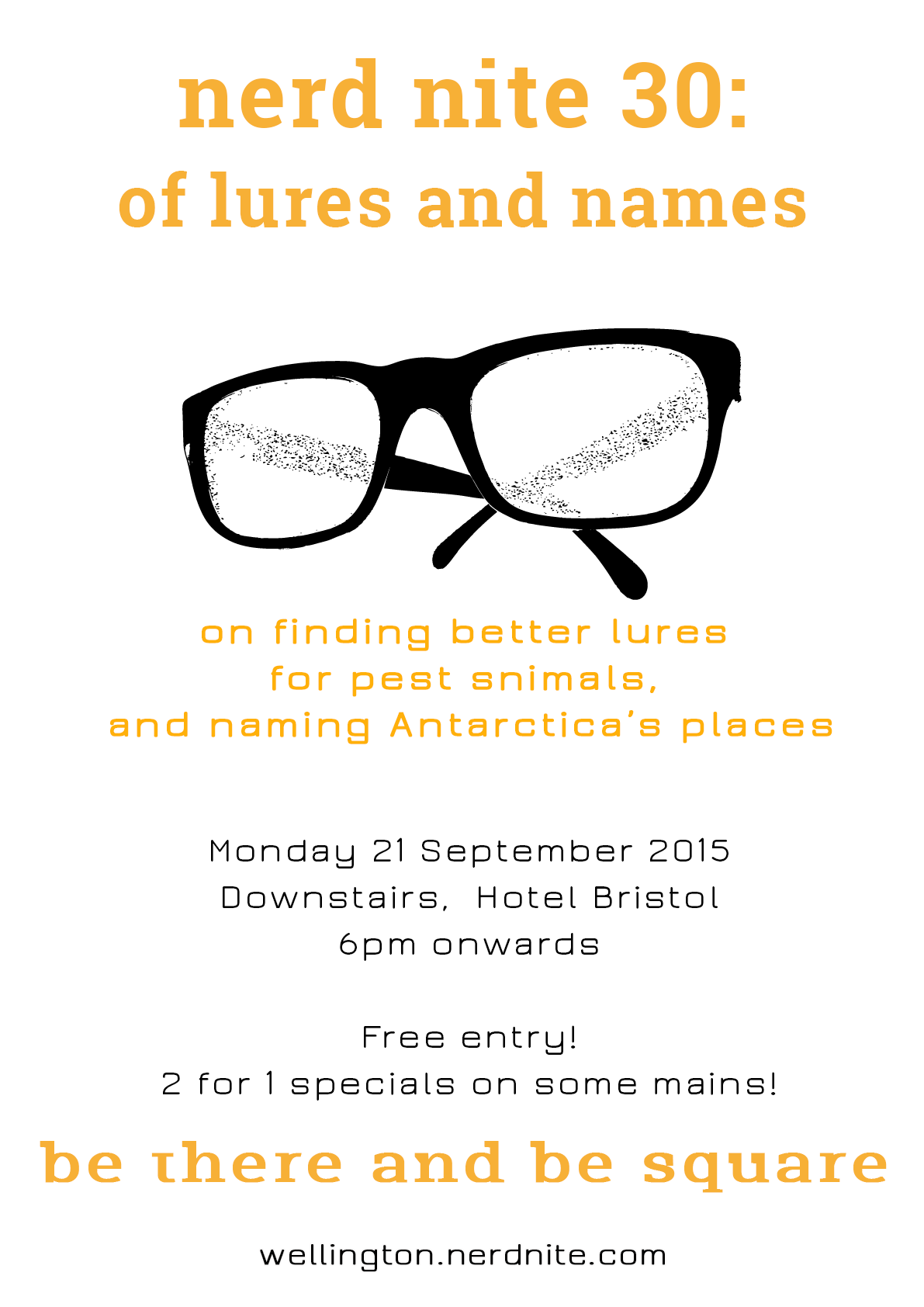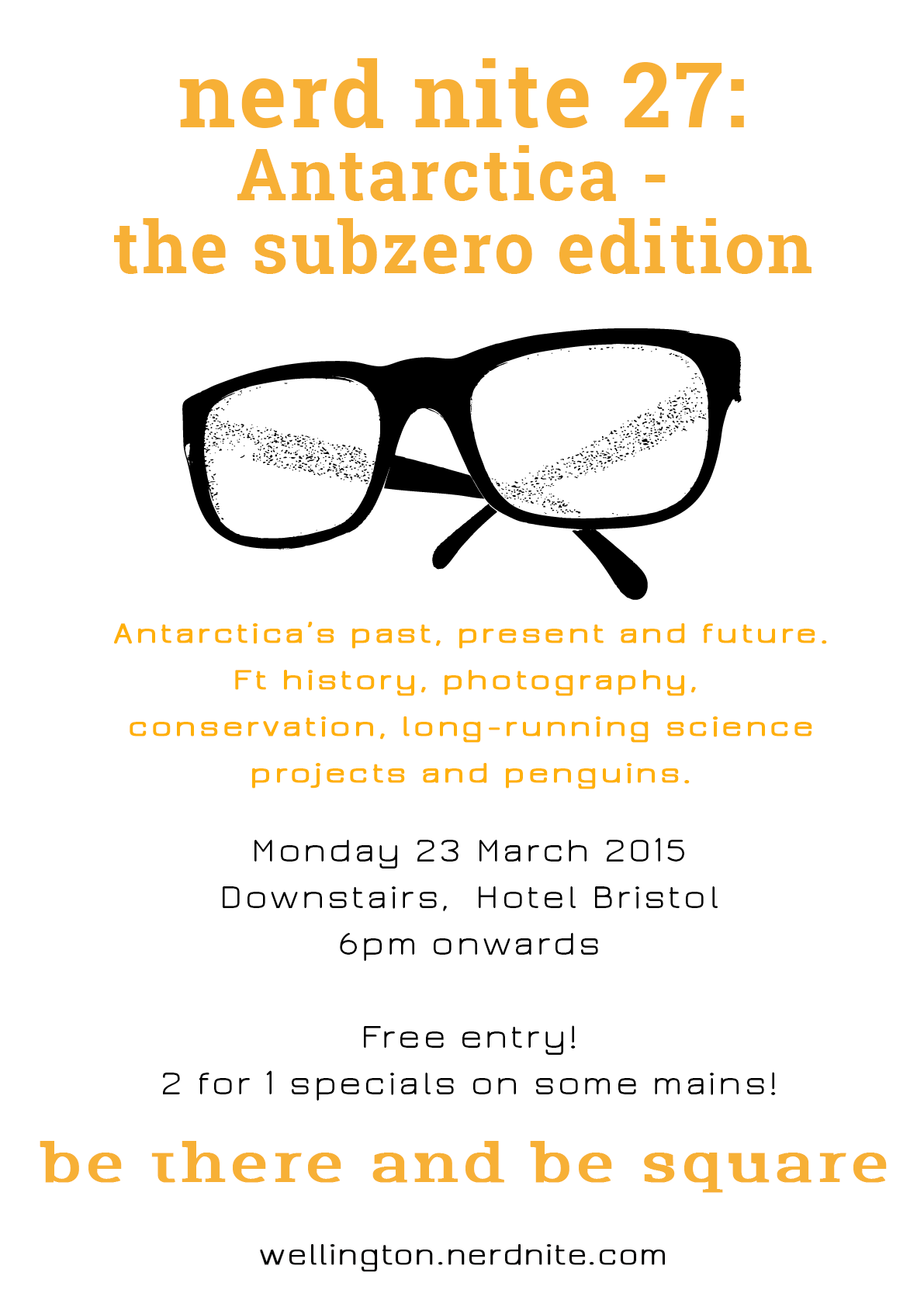Posts Tagged ‘antarctica’
nerd nite 30: of lures and names
We’ve hit number 30, ladies and gentlenerds! This very special edition will be taking place at:
- Hotel Bristol
- 6pm (speakers to start at 6:30pm)
- Monday 21 September 2015
As always, seating may run out, so don’t rock up at 6:30pm expecting to get a decent seat – or one at all.
—–
LINEUP
—
Pied Piper Wanted: Better Lures for Pest Mammals
Robert Keyzers
Pest mammals (rats, stoats, possums, etc) are a scourge for NZ’s native fauna, as well as a significant economic risk for our export food industry. Traditional poisoning and trapping methods for control have a limited ability to keep pest levels in check, especially at low population densities. It is therefore imperative to develop more advanced technologies to attract shy pest mammals into traps to effect complete eradication in significant bush or pastoral areas. This talk will describe some of our recent attempts to assist in this endeavour.
Rob is a Senior Lecturer in Chemistry at Victoria University and leads the Natural Products Chemistry research group which studies metabolites from food and wine, and isolates and characterises novel bioactive compounds from marine organisms collected in NZ and the Pacific region.
—
Naming the un-named
Kate Bazeley
The Antarctic Peninsula was first sighted over 200 years ago, with the first people stepping onto land 80 years later, in around 1900. Now, there are approximately 35,000 tourists visiting the Antarctic Peninsula per year, as well as numerous scientific research stations being operated by several nations, both year-round and seasonally.
On a continent with no native population, how do you go about imposing names on such a vast blank canvas? If you are interested in Antarctic history, geography, science and culture, come along and learn about the Antarctic Peninsula region.
Kate studied geography at Newcastle University in the UK and is particularly interested in how glacial rivers influence their surrounding landscape. During her degrees she undertook fieldwork in Greenland and Iceland. Kate went on to work in the Mapping and Geographic Information Centre at the British Antarctic Survey for 4 years, where her main role was Secretary of the Antarctic Place-names Committee. She spent 3 months at Rothera, the main UK Antarctic base, in summer 2014. Her interests include polar regions and maps!
—–
As always, NNW is free and open to everyone*. Bring your friends and family – someone to share a meal with, definitely, as there are some great 2 for 1 specials on the menu.
* Who behaves themselves, of course. Naughtiness will be stamped on. Hard.
nerd nite 27: Antarctica – the subzero edition
ANTARCTICA!! Its past, its present and its future are all subjects in Nerd Nite Wellington #27.
We warned you this edition was going to supercool. And yes, we apologized for the pun, but it was _so_ worth it.
This very special edition will be taking place at:
- Hotel Bristol
- 6pm (speakers to start at 6:30pm)
- Monday 23 March 2015
As always, seating may run out, so don’t rock up at 6:30pm expecting to get a decent seat – or one at all.
—–
THE LINEUP
—
Antarctica: the past
Rebecca Priestly, @RKPriestley
On her second trip to Antarctica, in December 2014, Rebecca engaged with Antarctica’s recent and deep history. In this presentation, which will include short video clips and photographs that won’t be as good as Rob’s, she reports on her experiences camping with the geologists studying Antarctica’s past climate, filming the conservators working to preserve Antarctica’s early 20th century history, editing an anthology of Antarctic science writing, and visiting Antarctica without seeing any penguins.
Rebecca Priestley has degrees in geology and history of science and is a senior lecturer at Victoria University of Wellington where she teaches a range of Science in Society courses. She has traveled to Antarctica twice: in 2011 she visited on the media programme, and wrote a series of articles for her science column in the Listener magazine, and in 2014 she visited Ross Island and the Friis Hills region of the Dry Valleys to film lectures for an upcoming online course on Antarctic history, geology and culture.
In her 2012 book, Mad on Radium, she wrote about “nukey poo”, the Antarctic nuclear reactor that helped power McMurdo Station in the 1960s. Her next book, “65 Million Years in Antarctica” is an anthology of Antarctic science and will be published by Awa Press in 2016.
Antarctica: the present
Rob Suisted, @RobSuisted
Rob Suisted was a senior conservation manager before leaving a career to follow his passions of wildlife and wilderness. He’s built a successful business telling stories visually. Science is a constant companion.
15 trips to Antarctica later he’s gathered some interesting, often hair raising, sometimes funny, insights into this continent; gained from visiting many areas and guiding a wide range of people (from rockstars to diplomats, to oil company execs) through many experiences. He’ll share some stuff with passion (like how to control men (learnt from huskies) or, at 20tonnes of carbon per trip, should tourists visit?). As a professional photographer expect some great frames.
Visit Rob’s blog at http://blog.naturespic.com, or perve at his Antarctic photos at http://www.naturespic.com/NewZealand/result_country.asp?CountryID=Antarctica.
Antarctica: the future
Veronika Meduna, @VeronikaMeduna
As a producer and presenter of Radio NZ’s science show Our Changing World, Veronika has told more than a thousand and one stories about science and the people behind it. Many of these stories have been about Antarctica – so many in fact that she decided to write a book about Science on Ice.
Why is Antarctica such a great place for scientists? For many big scientific questions, the white continent is the best – and sometimes the only – place to look for answers. And although it is the only major landmass without permanent human habitation, Antarctica holds the key to how habitable our planet will be in the future. Veronika will take a tour through some of the long-running science projects in Antarctica – from astronomy to zoology – and yes, there will be penguins.
—–
As always, NNW is free and open to everyone*. Bring your friends and family – someone to share a meal with, definitely, as there are some great 2 for 1 specials on the menu.
* Who behaves themselves, of course. Naughtiness will be stamped on. Hard.

